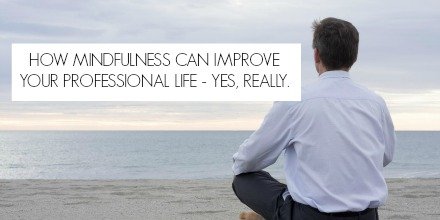
When you think of ways to improve your professional life, what do you picture?
A hotel conference room filled with peers in name tags, drinking watered-down cocktails?
Learning new software?
Studying for yet another accreditation?
While I’m sure all of those things will help your career, I’d like to suggest another skill set that’s a lot easier and more fun to acquire than any of the above. It’s also much more applicable to the other areas of your life than any work-related software.
What is this magic skill set?
Mindfulness.
It’s not hard to imagine how mindfulness helps you navigate the other, non-work parts of your life. You’re more patient with your children and more present with your spouse. You have the focus to enjoy your hobbies and interests. You feel centered and calm in your day-to-day life, not frazzled or pulled in a million directions at once.
But how does mindfulness fit into the world of meetings and expense reports? How can mindfulness make you a better employee or manager?
Mindfulness increases your emotional awareness
When you can be present, you can pinpoint your emotional triggers. You notice that every email from John in accounting stresses you out; you realize that lunches with Jenna in marketing energize you.
You also realize that after reading John’s emails, you’re more likely to snap at your intern and after lunches with Jenna you’re more likely to sign off on big projects. When you realize your emotional triggers, you can also notice how those triggers affect your interactions with other people.
Mindfulness also helps you sense other people’s emotions, which improves your professional relationships and helps you work more effectively with others. You’ll notice that your boss is on edge and reschedule your pitch. You see that your colleague is quietly struggling and step in to help.
Mindfulness gives you more confidence + helps you move beyond your ego
There is a self-assurance that comes with understanding your own strengths and weaknesses. There is comfort in acknowledging where you shine, where you struggle, and where you should just hand over the task to someone else. Mindfulness helps you tap into that confidence and knowing.
When you’re truly at peace with who you are and where you excel, you can let go of ego. You realize that the size of your ego is up to you; it can be big when you need to lead a team and small when you’re learning a new skill.
You can stop taking on projects that aren’t right for you or nervously accepting work you don’t really understand and then feverishly google instructions. You can let go of imposter syndrome once and for all.
Mindfulness allows you to see yourself objectively + distance yourself from challenging emotions
When you’ve made mindfulness part of your daily life, it’s easier to step back and be with a situation – and yourself – objectively. Rather than allowing yourself to get upset by the accountant’s email, you can read it with emotional awareness and pull the pertinent information from it.
Your mindfulness practice will remind you that you are not, in fact, your emotions or your thoughts. Instead of thinking “I’m angry at John,” you can shift your mental energy in the direction of “I’m experiencing anger about a situation in the accounting department.”
Mindfulness will teach you to take a calming, distanced, third-person approach to situations, events, or people that might otherwise frustrate you.
Have I convinced you? If you’d like to give mindfulness a try, download my free ebook Mindfulness Starts With You: 7 Daily Micro-Practices to Shift Your Experience.
If you think your colleagues could use a bit of mindfulness between marketing meetings, take a look at my corporate offerings!




